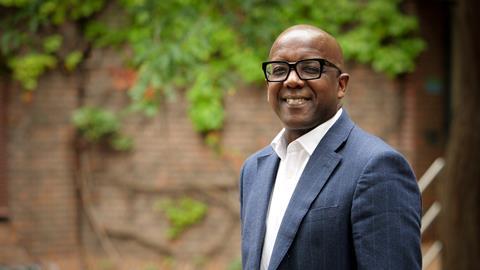My parents both left school in Jamaica at 13 and emigrated to the UK in 1959 as part of the Windrush generation. I was a working-class kid from Mitcham, South London. I left my low-achieving school with four GCSEs and three career options, courtesy of a grumpy careers adviser: tennis racket stringer, warehouseman, or outdoor clerk at a law firm.
I chose the law firm, and although I was incredibly shy, I took a genuine interest in law. I would even stand in front of the mirror at home and pretend to be Jonathan Rollins from LA Law. A year later, I started studying to become a legal executive, combining working full time with half a day a week of study leave and taking correspondence courses. Then, I went on to do additional diplomas and then the Law Society Finals to become a solicitor.
I didn’t have a Russell Group university degree - which, sadly, some law firms still prefer today - in fact I did not have any degree at all and yet I made history in 2021 as the first black senior partner of a top-100 law firm, Moore Barlow, where I’m now in my second term.
But getting here was not a walk in the park. The exams were challenging, particularly because I didn’t have the academic experience. Although my confidence grew with each exam, the imposter syndrome truly hit me once I qualified.
What felt overwhelming was that when I looked around, there was no one else like me; everyone was white, had a top-tier education, and had worldly experiences, whereas I’d never even been on holiday abroad as a child.
I tried to blend in, which I called ‘the chameleon effect’, and as I became more senior, I felt more comfortable being my authentic self. Unfortunately, as my career grew, I encountered countless people who patronised me because of my alternative route into the sector. Even outside of work, when driving a new company car, I lost count of how many times the police stopped me because they assumed I’d stolen it.
I felt that I was looked down upon as a lawyer because I didn’t have the traditional background, but now I know that not only did I not go to university, but that did not need to be a prerequisite to a career in law, and my experiences made me more determined and resilient.
I’ve conducted many of the country’s highest profile cases in my time, including the Wimbledon School crash incident last year, the Westminster terror attack, the Croydon tram crash, representing Jimmy Saville’s victims and winning at the House of Lords in a landmark employer’s liability suicide case.
The crucial thing is if I can achieve this career with my background, I believe that anyone can. Having overcome so many obstacles to achieve this position, what matters to me is that other solicitors with similar backgrounds shouldn’t face the same hurdles.
I believe it’s not just about qualifications. It’s about application. Anyone who knows me will have heard me say, ‘Don’t just aspire to climb the ladder. Be the ladder.’ I’m still friends with the people who were my ladders when I was building my career.
Sadly, the troubles I faced are still prevalent for many children today, and the gap for disadvantaged pupils has reached the highest level since 2012 (Data from Education Policy Insights).
I want this gap to close. That’s why I’m launching the Be The Ladder Foundation; it will provide tools and support for children not achieving their academic potential and ultimately give them better opportunities.
I’m currently in talks with three schools where the foundation will be piloted, and I’m hoping to roll it out further, giving more access to tools and support to children across England.
The Be The Ladder Foundation will open doors for young people from disadvantaged backgrounds and give them a step up in whatever career path they aspire.
I want other individuals to join me in being the ladder for these people, offer advice, share your experience and pay forward. I will continue to help as many people as possible to realise their dreams of joining and flourishing in the legal profession. And when they do, I hope they too realise that to make a difference truly, they also should and must help others along the way – to be the ladder rather than merely climbing it.
The big problem is that lack of diversity breeds a lack of diversity. I encourage all law firms to look around, note who the most senior people are, the level below that and then across the whole business. If it’s not a representation of the wider society you see in your day-to-day life, then you have a starting point – and perhaps you do have a problem that needs addressing.
Trevor Sterling is senior partner at law firm Moore Barlow































